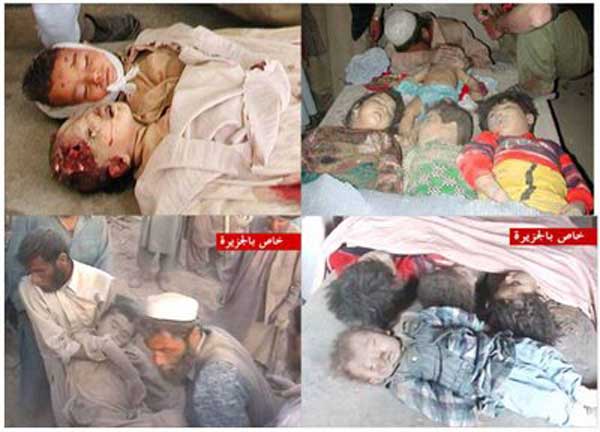$2000 Per Dead Afghan Child
By Francis Shor
28 February, 2010
CommonDreams.org

$2000 per dead child! That's the amount of compensation offered by the Pentagon for the "collateral damage" which it has caused in Afghanistan. As the war escalates and more innocent victims of Washington's aggressive actions accumulate in number, the US military calculates what it will take to placate grieving Afghan parents.
Eight years into a war deemed "necessary" by both Republican and Democratic Administrations, the death and destruction visited upon Afghan civilians seems reducible to neat and cheap compensation packages. And, yet, the real physical and psychological damage inflicted by the war-makers remains strangely abstract and without comprehension of the very real unintended consequences. The anger of Afghan families in the earliest days of US military intervention undoubtedly persists and may even fuel the continuing insurgency. According to a June 28, 2002 Los Angeles Times story about one Afghan who had lost his wife, mother and seven children to a US air attack, he bitterly lamented: "I put a curse on the Americans who did this. I pray that they will have the tragedy in their lives that I have had in mine."
While not suffering this kind of tragic loss in just one family, US families have paid a price with increasing numbers of dead and wounded in Afghanistan. More generous with their compensation packages to families who have lost a loved one in military operations in Afghanistan, even the $100,000 offered cannot excuse the needless loss of life promulgated by the Pentagon and their so-called civilian bosses.
The squandering of billions of dollars, however, in prosecuting this war and the other imperial campaigns in the Middle East and Central Asia is responsible for other hidden costs to children in the United States. In 2009, the US continued its falling ranking in infant mortality to 33rd in the world, behind the much poorer, but medically wiser, nation of Cuba. In addition, infant mortality among African-Americans is estimated to be twice as high as that of whites.
On the other hand, the terrible toll on Iraqi children, as a consequence of policies pursued by the United States since the first Gulf War, has been enormous. From the use of depleted uranium by the Pentagon under Bush Sr. and Jr. to sanctions preventing medical supplies from entering Iraq under Clinton, the death and disease suffered by Iraqi babies is directly attributable to the United States.
Even in the absence of war and aggressive policies pursued by Washington, the imbalance between the United States and the developing world, made worse by the recent financial crisis, is deplorable. It is estimated that the average inhabitant of the United States uses 250 times the resources of the average Nigerian. That average US citizen, if a baby born in the 1990s who reaches 75 years of age, will have generated fifty-two tons of garbage while utilizing close to 4,000 barrels of oil. The amount of energy consumed by the average US resident would be equivalent to 531 Ethiopians.
When UNICEF reported, as is did in 2002, that ten million children under the age of 5 died each year from preventable causes, such as malnutrition, unsafe water, and the lack of the most basic health care, we should, in the words of ethics philosopher Peter Singer "know that others are in much greater need...and learn to think critically about the forces that lead to high levels of consumption and to be aware of the environmental costs of this way of living."
Yet, to attain that level of consciousness would require confronting the legacy of being part of an empire and benefitting from its ostensibly unequal privileges. Trying to come to terms with all of the human and planetary consequences of empire as a way of life may be especially difficult now that the empire is dying. Let's just hope that we can help to diminish the further destruction produced by an empire in its death throes.
Francis Shor is author of the recently published, Dying Empire: US Imperialism and Global Resistance. Excerpts from the book can be found at dyingempire.org


